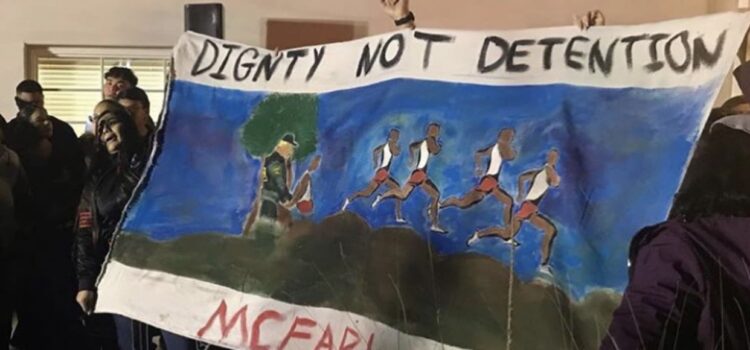
Hundreds are expected to oppose GEO’S request to expand immigration detention capabilities at McFarland’s second Planning Commission Meeting Tuesday.
Opponents of the plan, including community partners, faith leaders and residents plan to gather at 4 p.m. for a march to raise awareness of the moral, economic and health ramifications of GEO’s potential expansion. The march begins at 400 W. Perkins Ave. It will end with a press conference at 5:30 p.m. at the Veteran’s Hall, 103 W. Sherwood Ave. in McFarland, where the meeting will be held at 6 p.m.
“Community members also want to expose GEO’s exploitation of McFarland’s fiscal vulnerability,” says a press release by The Rapid Response Network of Kern. “A multi-million dollar corporation is offering very little to a city in need, with a high cost in family separation and fear. When our undocumented neighbors are afraid to drive, afraid to take their children to school, or our youth are afraid to go to school, it also puts Kern’s economic stability at risk.”
The GEO Group, Inc., the private prison company that operates Mesa Verde Detention Facility in Bakersfield, is working with city officials to use the Golden State Modified Correctional Facility, an old state prison, for immigrant detention; however, many McFarland residents oppose the plan.
Rosa Lopez, a policy advocate and organization with the ACLU of Southern California, said it seems McFarland’s elected officials haven’t been responsive to the complaints and concerns raised by the residents of McFarland.
The Planning Commission Board has 180 days to make a decision regarding GEO request; however, they are moving much faster. The commission had its first meeting in late January, where hundreds people showed up in opposition of the expansion, while others supported it.
The Planning Commission’s meeting could possibly be the final hearing on GEO’s request to modify its conditional use permit to expand its immigration detention capacity in Kern from 400 to 1,800 beds; however, opponents argue officials have not gone through the proper process.
After the first meeting, Jordan Wells, an attorney with ACLU’s Kern office, submitted a letter to the McFarland Planning Commission with concerns regarding GEO’s applications for conditional use permits to operate immigration prisons in McFarland.
Wells writes in the letter that the Commission has not made available the permit applications. Once they are made available, then the public can comment on them.
“Until McFarland gives adequate public notice of the applications under review, it cannot begin to complete the two hearings or the 180-day notice period required under state law,” Wells writes in the letter.
Wells also mentions concerns regarding interpretation services. At the January meeting, the board did not provide translation services until residents repeatedly asked for one. That’s when the board allowed a GEO employee act as a translator.
“For the public to participate meaningfully in these hearings, the Commission must offer interpretation services, which it failed to do at last week’s hearing,” Wells said in the letter.
Lastly, Wells said the Commission must ensure equal opportunity for public input at these hearings, “regardless of viewpoint.” At the last hearing, the board heard from nearly a dozen speakers in favor of GEO expanding immigrant detention capabilities, before hearing from those who oppose the idea.
At last week’s City Council meeting, many residents complained about the lack of services provided at the first Planning Commission meeting in January; however the City Council committed to providing translation services to Tuesday Planning Commission meeting.
If the permits are approved, the contract will last for 15 years. Because this process began before the new year began, AB 32, which plans to phase out for-profit prisons in California, does not apply until the contract expires in 15 years, Lopez said.
The people of McFarland have power in this situation, Lopez said.
“I hope that people understand the kind of power and influence they have over this kind of decision,” she said. “I hope the city of McFarland understands the power they have, and they are the ones to decide who should be in office to represent their interest.”